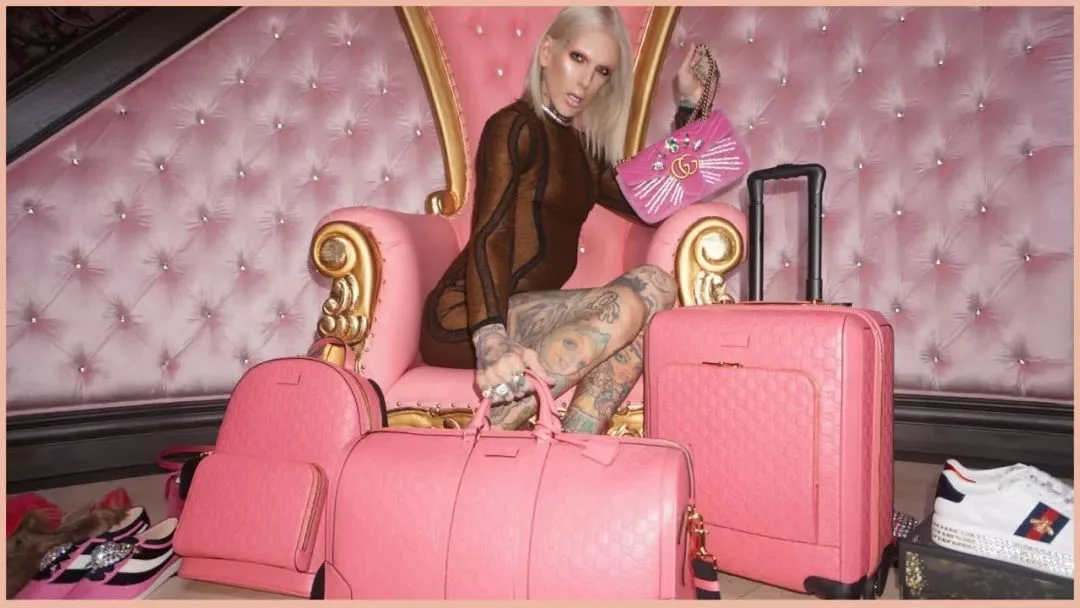The murky world of PR gifting could be changing
The Murky World of PR Gifting Could Be Changing
Gifting has been around for decades. Whether it’s the offer of a trip, treatment or product, freebies are part and parcel of fashion and beauty journalism. But adding influencers to the mix has pushed numerous issues to the forefront.
Image Credit @ Jeffree Star Youtube
Victoria Magrath, the woman behind Inthefrow, describes a PR gift as “an item or service given to a person of influence in the hope that they will share their experience with an audience.” Recipients aren’t required to mention their free shoes or facial but PRs bet on the fact that they will. Plus, it’s free advertising for brands. Sending products to esteemed journalists or people with millions of followers costs very little in comparison to a huge campaign.
The practice of gifting slotted perfectly into haul culture. YouTubers would unbox item after item, creating a lifestyle that idolised pretty packaging, ostentatious add-ons and, most importantly, lots of new stuff. While some subscribers still can’t get enough, a growing movement is asking for less superficiality.
As the Guardian reports, bloggers and vloggers are beginning to shun the “more is more” attitude. Their posts and videos centre on using rather than abusing. They’re decluttering, sending a message to brands that product after product is no longer wanted. Some admit to receiving so much stuff that unopened items are being thrown away (or donated where possible). Others lament being sent every shade in a make-up range when it’s obvious that no one person can use it all.
It’s not just influencers that have had enough. Journalists can also receive multiple parcels in one day along with countless emails offering a free unmissable experience. Cheryl Wischhover, a former beauty reporter at the now defunct Racked, once wrote that she had received $64,000 (around £49,000) worth of gifts in just six months. She’s not alone. A PR for a haircare brand also told Racked that his team would send every new product to around 60 print editors, up to 100 digital editors and between 300 and 600 influencers.
These mass mail-outs often involve excessive Instagram-friendly packaging. With layers upon layers of tissue paper, bubble wrap and more, revealing the goods inside is a gargantuan task. This presents another more pressing problem: environmental waste.
In 2018, awareness campaign Zero Waste Week reported that the cosmetics industry produces 120 billion units of packaging each year. Those boxes in turn result in the annual loss of 18 million acres of forest. The catch 22 is obvious. Reducing packaging helps the planet, but may culminate in less brand exposure. Big and bold does, after all, capture the human eye.
But brands and influencers sometimes forget that damaging statistics and shady practices remain in the mind and heart. The entire concept of gifting has an unethical feel. Although no promises are made, a person is much more likely to favourably promote a company if it has presented them with a gift — and much less likely to criticise it. Journalists can easily lose their impartiality. In fact, some publications actively ban their staff from accepting gifts above a certain monetary value.
Influencers, on the other hand, don’t have a set salary and may rely on positive brand relationships to boost their income. Failing to post about an extravagant gift could remove their name from VIP lists, detrimentally impacting their career. That possibility — the possibility of being shut out — may naturally encourage glowing reviews.
It’s not like their followers have to know. Or do they? The UK Advertising Standards Authority who enforce the CAP Code (the UK rules that cover non-broadcast advertising (for example print, online), sales promotion and direct marketing) only requires an #ad hashtag disclosure if an influencer has been paid in some way (including with a freebie) and allowed the brand to have a degree of editorial control over the content. Gifting doesn’t fall neatly under that remit. As the ASA explain ‘If you’ve been ‘paid’ (either in money or in gifts/freebies),’ but have been paid in absence of an ‘affiliate arrangement with the brand’ and they don’t have any ‘control’ of what or when you post, it’s unlikely that the content will count as advertising under the CAP Code. ‘
That said, when a brand rewards an influencer with a payment, free gift, or other benefits, this is still subject to regulation under consumer protection legislation enforced by the Competition and Markets Authority (CMA). As we reported earlier this year, The CMA expects influencers to disclose when they’ve received any form of monetary payment, a loan of a product or service, any incentive and/or commission or have been given the product they’re posting about for free.
As George Lusty, the CMA's Senior Director for Consumer Protection points too: "If celebrities or influencers are posting about a product on social media, they must make it clear if they've been paid to promote it, or have been gifted, loaned a product or thanked in some other way by a brand. No one should be left thinking that a Tweet or Instagram post is just the person's opinion when it's not.”
So is the clever yet slightly manipulative tradition on its way out? Yes, but not in the way you might think. It won’t stop, but its methods may change.
A desire for authenticity is leading both journalists and influencers to place more value on transparency. It’s unlikely that any will outright ban gifting, but disclosing every item that wasn’t the product of a genuine transaction is the new best practice. Some individuals are encouraging PRs to only send samples if they are requested or, alternatively, to send a much smaller parcel with one select product. More still are calling out environmentally-damaging packaging, turning what could have been a complimentary post into a negative one.
Influencers using their influence for good. What’s not to like?
Written by Lauren Sharkey and Edited by Tania Phipps-Rufus


